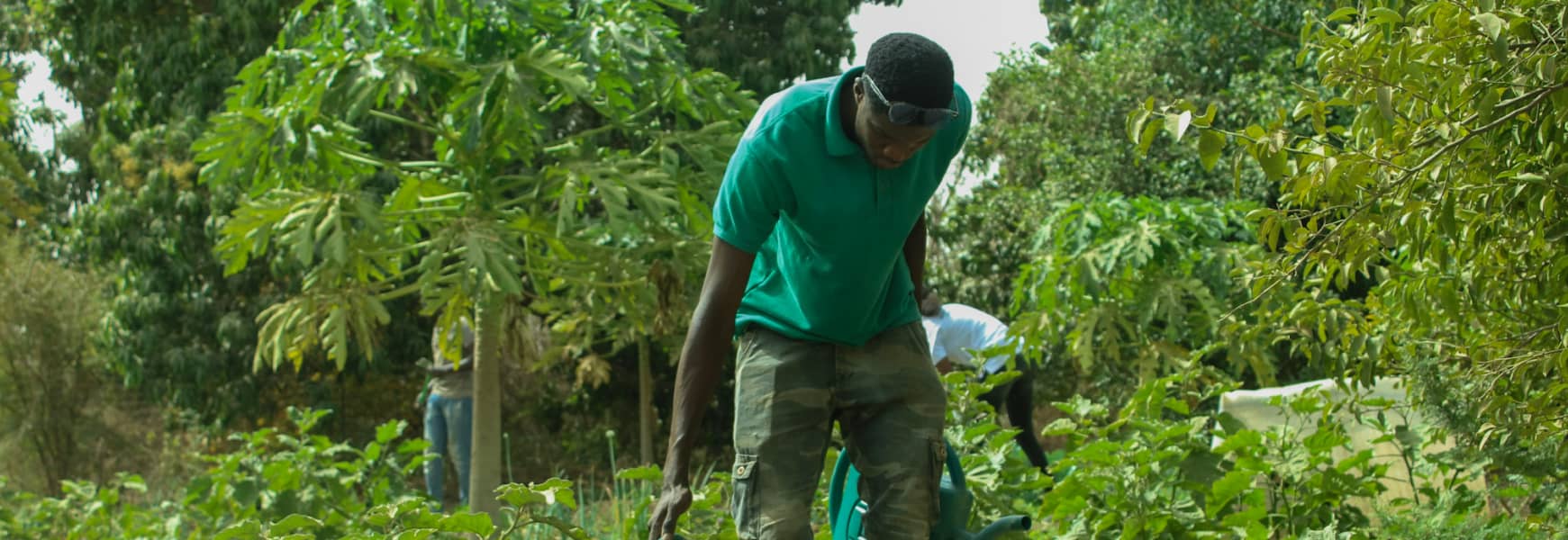Agroecology in Senegal: Lessons from Mohammed’s Innovative Model Farm
Surviving l’hivernage with agroecology: with the help of our local partner Agrecol Afrique, an independent producer in Senegal has found a way to protect his crop during the dreadful rainy season, and is now inspiring other farmers to follow his lead.
Thiès is the third largest city in Senegal. It resembles a mini-Dakar: narrow streets of cement and unfinished buildings buzz with street vendors, unlicensed motorcycles, and corner cafés selling mostly Western food. While Dakar’s coastline enjoys a fresh sea breeze in April, Thiès is engulfed in crushing heat that tastes like sand and smells like gasoline. But weather aside, the city is a marketplace of innovation and ideas, and a testing ground for innovative and sustainable farming methods like agroecology, the region being one of the country’s top producers of groundnuts. So, the Groundswell International team spent a few days in Thiès to visit our local partner, Agrecol Afrique, and learn more about their work with smallholder farmers.
We hopped in a minibus and crossed a vast field of baobabs, their branches casting long shadows over the barren soil. Frail touches of green popped here and there, but the landscape mirrored the heat: arid, dusty and imposing. Until we arrived at Mohammed’s farm, an independent producer working with Agrecol Afrique in the Thiès region.
Here, mango and cashew trees offer a refreshing relief from the sun. Cauliflower thrives alongside onions and eggplant, and red peppers sprout from the moist soil. Happy chickens roam through carefully dug alleys, where various vegetables and fruits cohabit in harmony—an entirely unexpected sight after what we witnessed on the road.
Mohammed collaborates regularly with Agrecol Afrique to test and adopt new agroecological practices for his farm. After trialing different techniques, patiently monitoring what worked and what didn’t, he can now rely on his farm to produce high-value crops like red pepper—one of the most expensive products sold at city markets. Mohammed is proud of his model farm, where students gather on weekends to learn about agroecology.
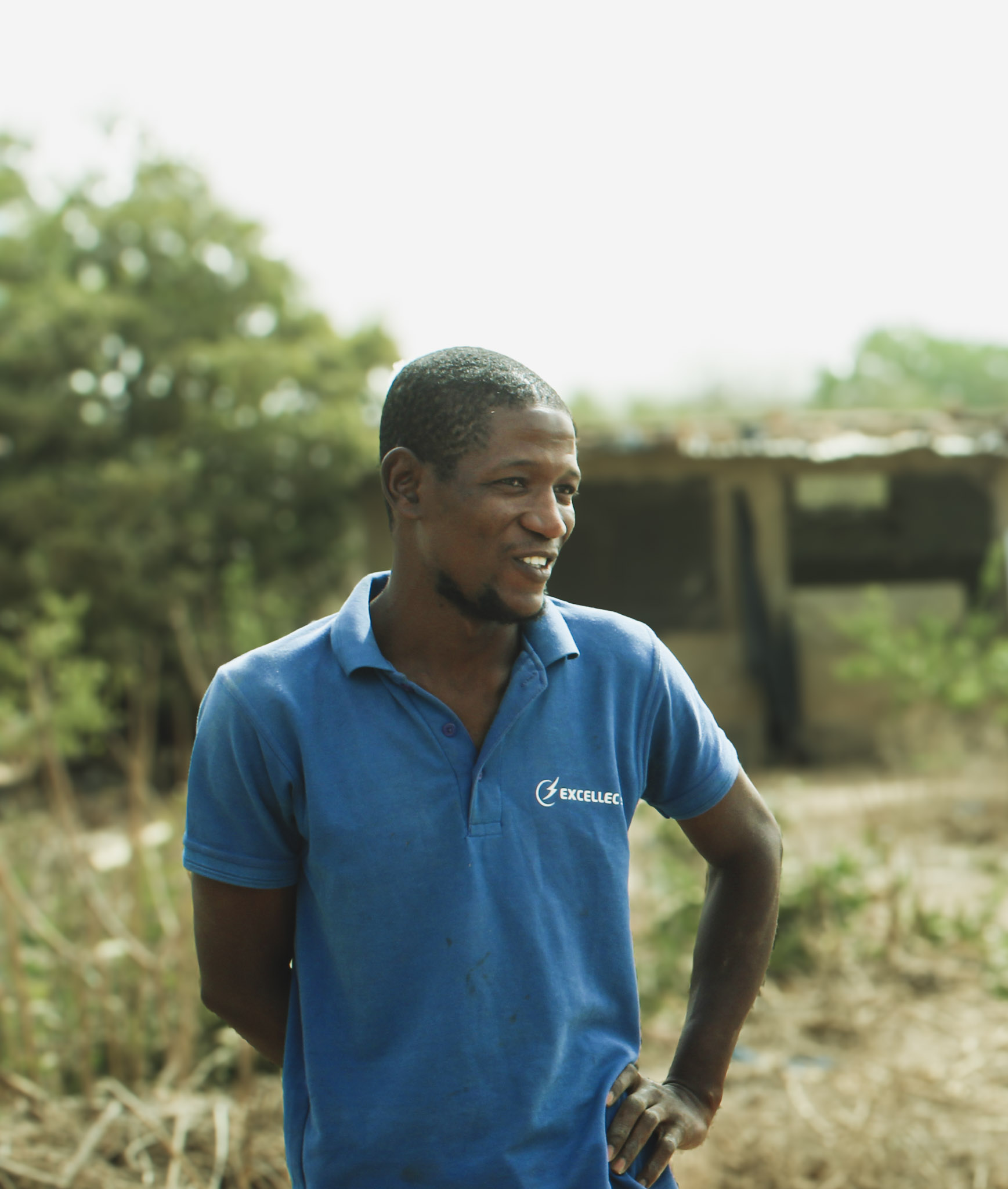
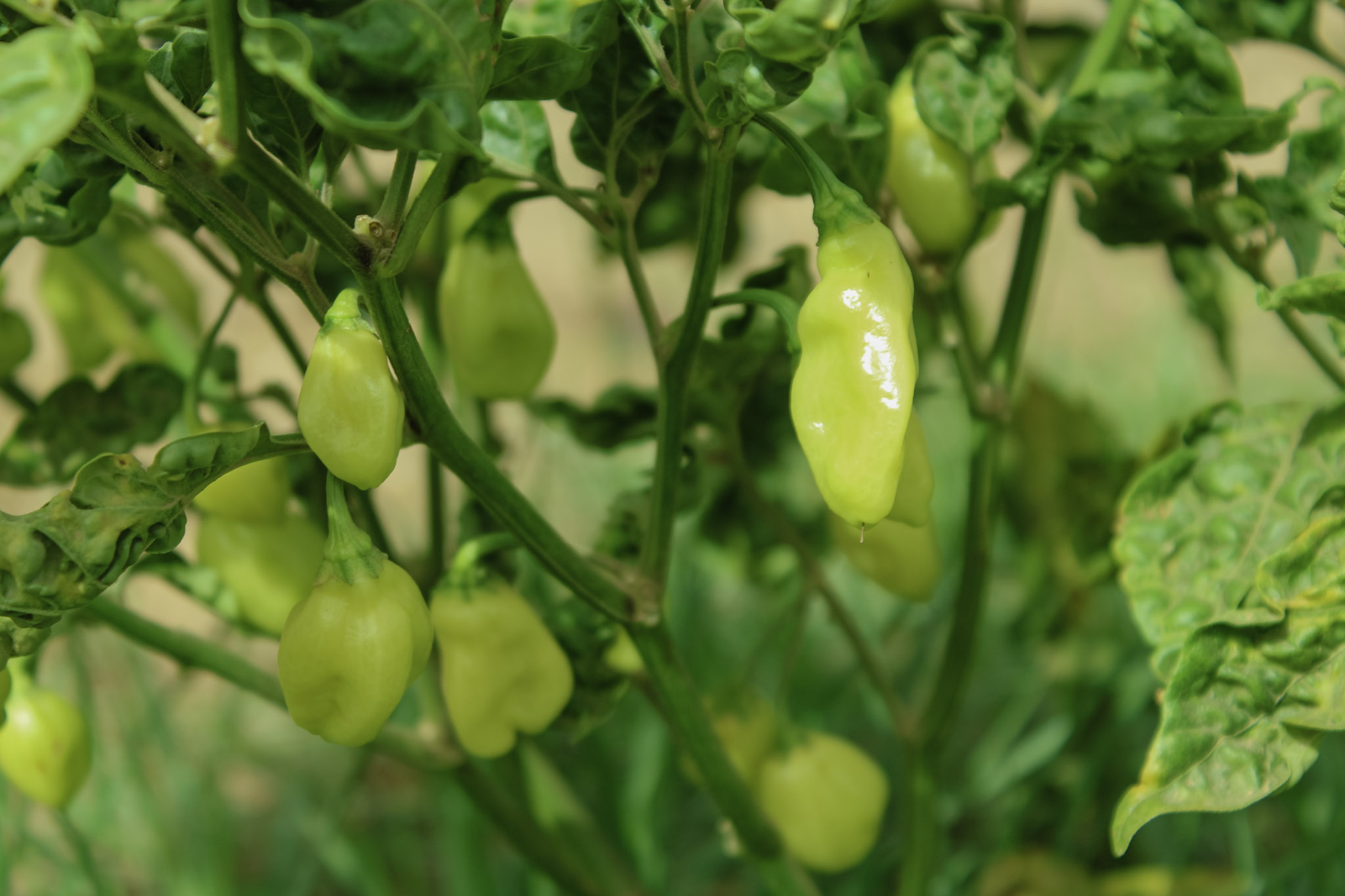
But it wasn’t always this way. Before working with Agrecol Afrique, he practiced conventional farming methods. He relied on chemical fertilizers and synthetic pesticides, but later realized they damaged the soil and weren’t financially viable. These fertilizers reduce the soil’s capacity to resist flooding, so even if they boost yields in the short term, the long-term effect is often disastrous—both for farmers and their land, especially during the rainy season.
Safeguarding crops during the rainy season with agroecology
Senegal is marked by two seasons: the North of the country has a dry season from October to May, and a rainy season from June to September called l’hivernage—”wintering” in French. But don’t get fooled by the name. The wintering is marked by torrential rain and intense heat, making farming particularly tough during this part of the year.
In March, farmers brace themselves as they expect a season of reduced yields, lower income, higher food prices, damaged crops, and more challenging life conditions. They know they’ll lose some (or all) of their crops and need to carefully consider how and what they grow prior to this season to ensure proper returns. But this preparation takes time and resources, often unavailable in the region. In fact, only 10% of farmers are active during this season, as they take seasonal jobs before returning to farming.
To support Mohammed during this period, Agrecol Afrique introduced a variety of sustainable farming techniques to safeguard his crops and prepare the soil to handle large amounts of water, sudden periods of intense heat, and drought.
One such method is called organic seed coating.
This technique involves coating seeds with beneficial microbes and biodegradable waste products such as clay and ash. It improves seed quality and handling, leading to more efficient farming and better yields. The specific coating technique and recipe are highly adaptable to the local context and the farmer’s needs and budget. It’s generally low-tech and doesn’t require expensive machinery, making it particularly well-suited for smallholder farmers.
Mohammed is one of the first farmers in Thiès to experiment with seed coating alongside Agrecol Afrique. But this method wouldn’t have reached his farm without a trip to South Asia, a couple of months earlier…
Spreading sustainable farming methods from South Asia to Senegal
Agrecol Afrique’s director, Assane, discovered the seed coating technique during a learning exchange visit in South Asia organized by Groundswell International. The purpose of the visit was to learn from our South Asian partners, and Assane was impressed by the results he observed in the communities he visited with our team.
He recognized that Senegal faced similar challenges and conditions as those in India. Seeing the potential of this technique for the communities he supports back home, Assane worked closely with Mohammed to adapt the method to Senegal’s local context and Mohammed’s needs. In just three months after implementing the new technique, they began to see positive results.
Seed coating helped Mohammed’s crops resist the rainy season by preserving seeds and improving germination. It also provided a barrier against birds and insects and protected seeds from being washed away during heavy rainfall. Combined with other sustainable farming methods, such as intercropping to reduce crop maintenance and retain water, Mohammed achieved higher yields.
Agrecol Afrique also facilitated Mohammed’s connection to organic city markets, providing him with direct access to consumers who value sustainable and locally produced food, which significantly boosted his income. In fact, since the beginning of his collaboration with Agrecol Afrique, his income has increased by approximately 40%, thanks to agroecology—mainly crop diversification—and enhanced access to city markets. His results have even convinced other farmers to switch from conventional farming to sustainable, regenerative agriculture—with his brother and father among the first to follow his lead, solidifying his role as a key player in promoting agroecology in Senegal.
With these positive results as visual proof, Agrecol Afrique tested the seed coating technique with three other independent producers and plans to spread the practice to more communities this year.
This is a prime example of Groundswell International’s action-learning network: we learn from each other across borders and continents, and our partners in the field work directly with farmers to experiment, adapt, and scale agroecology. Farmers have the knowledge and skills to innovate, overcome challenges, and improve their families’ well-being. Groundswell International, with its network of experienced partners, provides the resources to enable this change.
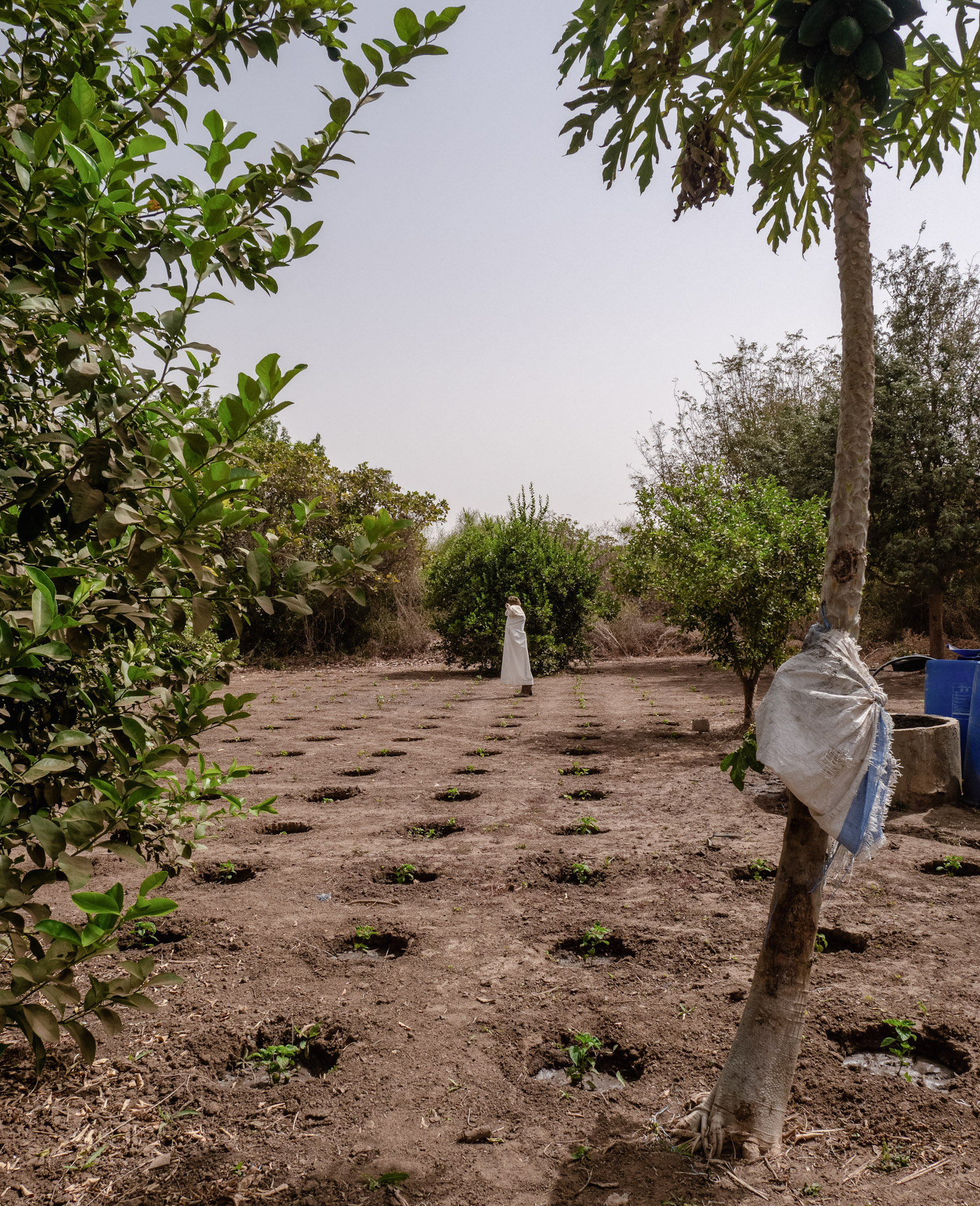
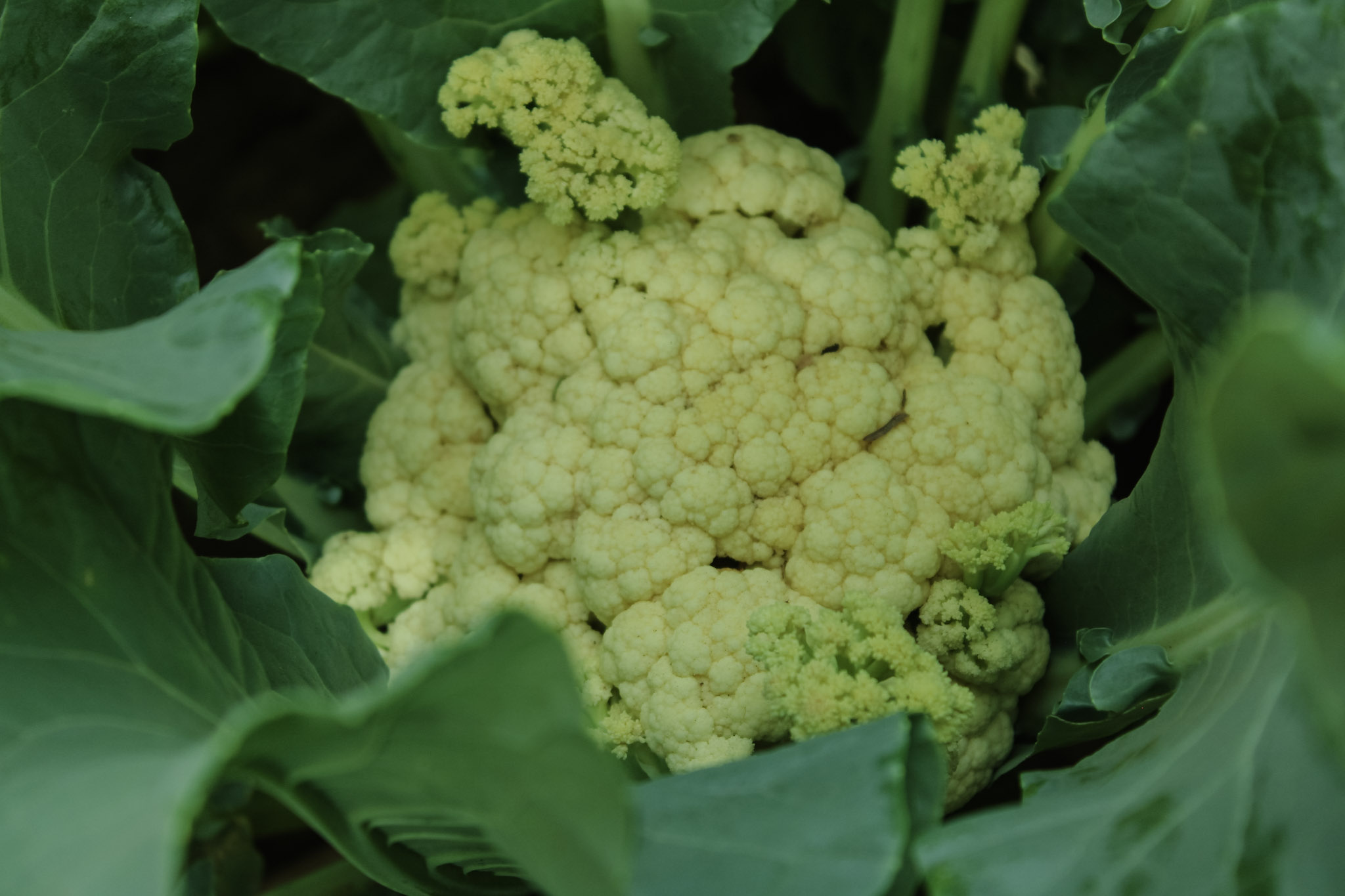
Involving youth to scale agroecology in Senegal and beyond
Mohammed transformed his garden into an experimental “model farm” where he invites agronomy students to learn about alternative farming methods. On weekends, he mentors young people on the benefits and challenges of agroecology, helping them set realistic expectations.
When I asked him how he persuades students to choose agroecology over conventional farming, he shared that many get excited about agroecology when they learn it can be more profitable than traditional jobs. So they start planting food that sells at high prices in markets, like red pepper. But red pepper is difficult to grow and requires specific soil conditions and extensive knowledge. Lack of experience, and aiming too high too fast, lead to disappointment and failure in their first year, causing them to give up on agroecology prematurely. Instead, he advises them to start with easy-to-grow crops like cucumbers, allowing them to learn and experiment with methods that work for their specific needs.
Mohammed always tells the youth that visit his model farm that “they need three things to succeed when building their first agroecological crop: passion, patience and objectives“. With these, young farmers can set realistic expectations and gradually grow higher-value crops sustainably.
Mohammed’s words resonate deeply, serving as a compass for us all. We all need patience, passion, and objectives to live fulfilling lives. Patience allows us to focus on sustainable growth, favoring quality and health. Passion enables us to do great work and not give up. Objectives provide a vision and a path to build and do things that matter. Without patience, how can we learn? Without objectives, how and where can we move forward? Without passion, why even care?
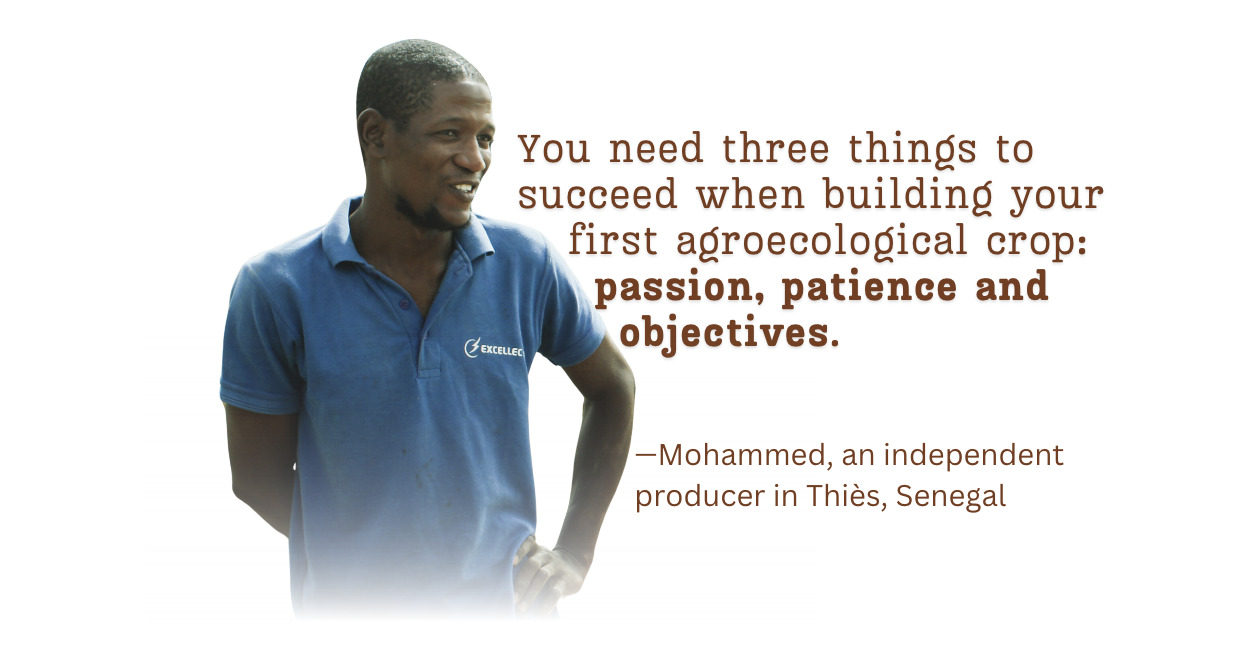
We left Mohammed’s farm with yet another proof that there is a better way to farm. One that respects nature, builds resilience to climate change, and empowers farmers to create and innovate, improving their lives and safeguarding their children’s future.
However, despite the adoption of agroecology, the rainy season remains challenging for smallholder farmers in West Africa. Erratic weather patterns make it increasingly hard to plan appropriately, and constant innovation and adaptation are needed to protect crops from future extreme weather events. It’s essential that governments, organizations, and individuals come together to support farmers during this time. Here’s how you can get involved:
Learn about agroecology: Discover how agroecology can heal our broken food systems. Our book Fertile Ground provides a comprehensive overview of agroecology as a plausible alternative to conventional agriculture, featuring real-life success stories from the field. Download your free copy or buy the paperback version to learn everything you need to know about scaling agroecology from the ground up.
You can also subscribe to our newsletter to receive stories from farmers like Mohammed once a month, in your inbox.
Invest in smallholder farmers: Help smallholder farmers build healthy farming and food systems and inspire global change. Your donation will provide the training and resources to strengthen their existing skills and help them improve their livelihoods on their own terms.
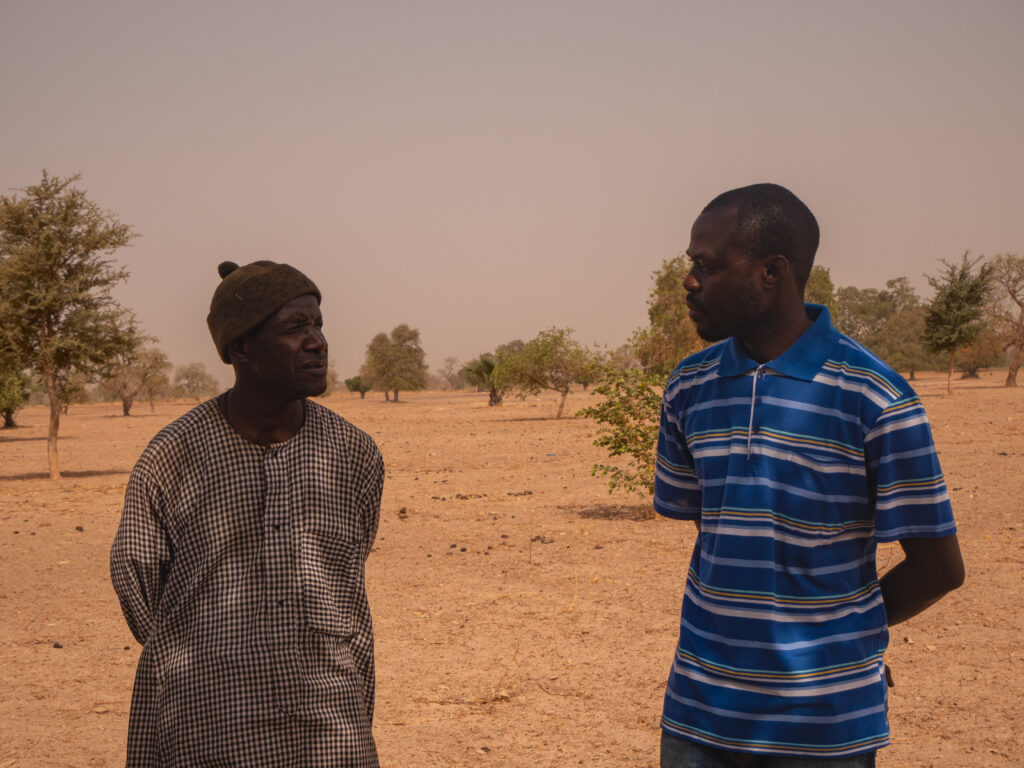
Help spread agroecology in Senegal
Your gift will directly impact smallholder farmers in the Global South and strengthen their capacity to build regenerative and equitable farming and food systems, safeguarding future generations’ rights to a fulfilling life.
Useful definitions
Zai pits: A zai pit is a traditional farming technique used in agroecology, particularly in arid and semi-arid regions of West Africa. It involves the digging of small, shallow pits, usually about 10-30 centimeters in diameter and depth, in which seeds are planted. These pits are designed to capture and concentrate rainfall and runoff, which helps to improve soil moisture and fertility in otherwise dry and degraded soils.
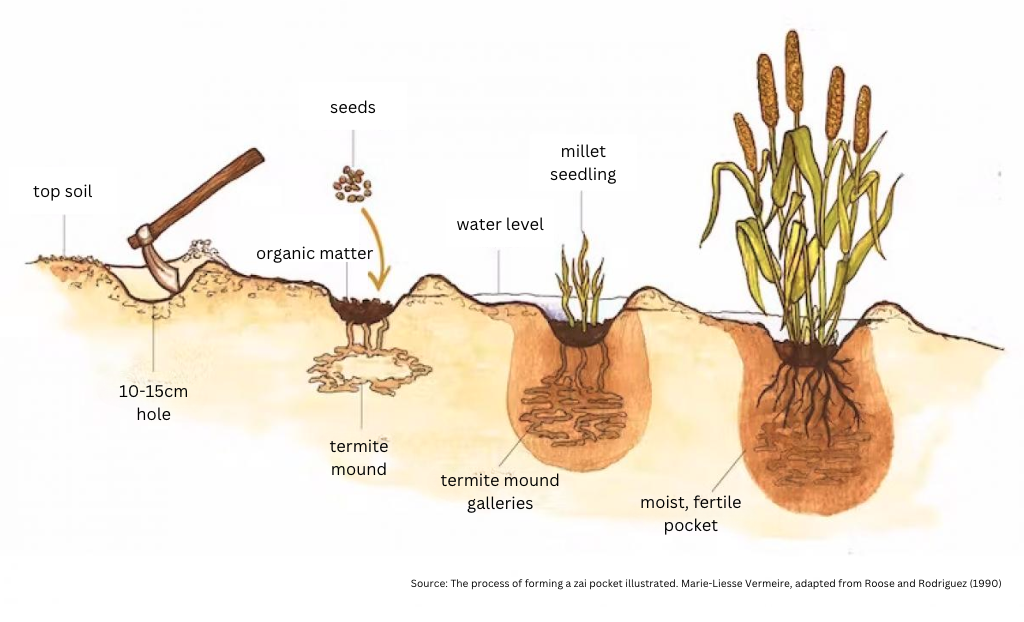
Model farm: A model farm is an agricultural plot designed to demonstrate and promote best farming practices, innovative techniques, and sustainable agricultural methods. These farms serve as educational and training centers where farmers, researchers, students, and agricultural professionals can learn about and observe successful agricultural practices in action.
About Agrecol Afrique
Agrecol Afrique is a non-profit dedicated to scaling agroecology in Senegal. Their specialty is enabling organic vegetable production through home gardens, women’s groups market gardening, and connecting organic producers to local markets in cities like Thiès. It operates in the Diourbel, Kaffrine, Tambacounda, Thiès, and Ziguinchor regions. Local teams are responsible for implementing and monitoring programs and projects in these areas.
Learn More: https://agrecolafrique.org/
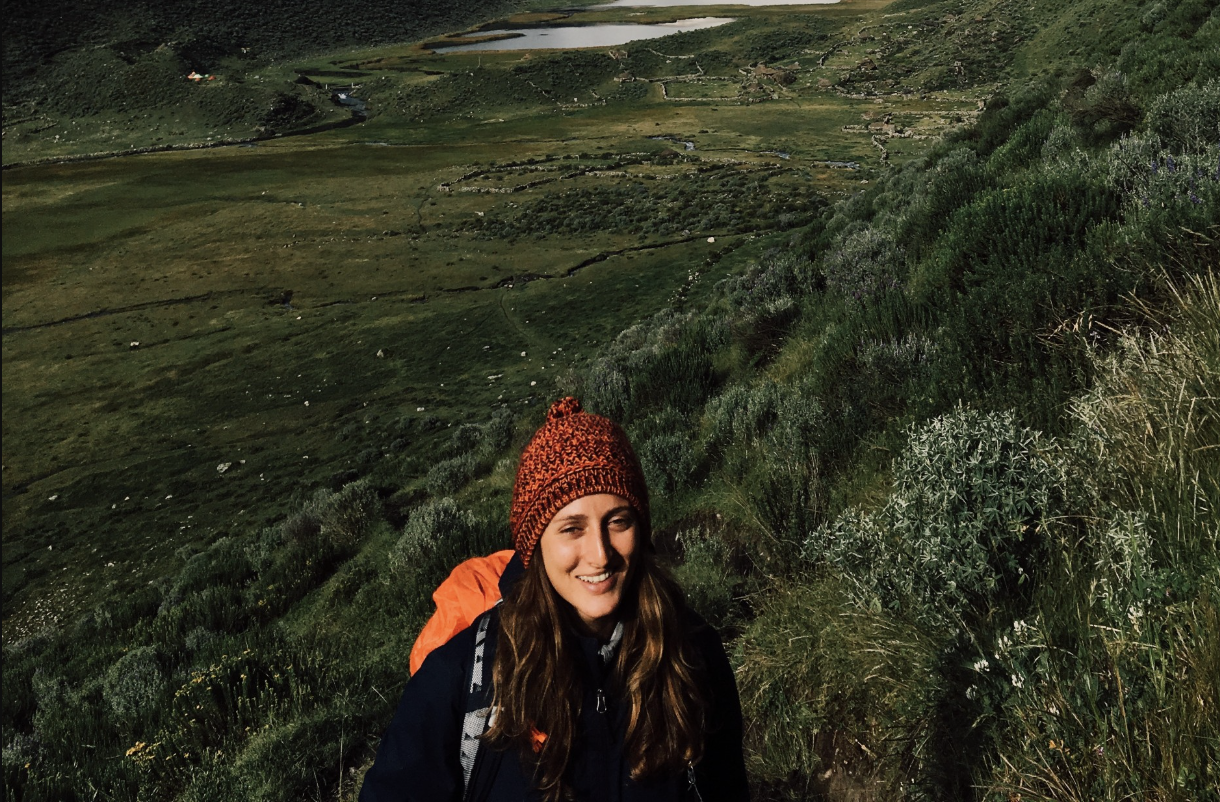
About the author
Maylis Moubarak
Maylis is Groundswell International’s Storytelling & Communications Manager. She’s lived in eight countries and worked for multinationals, startups, nonprofits, and social enterprises across four continents. Prior to joining Groundswell International in 2024, she spent over eight years working in editorial content, communications, marketing strategy, and international events in various industries. She’s passionate about crafting stories that bridge borders and inspire audiences to support meaningful projects.

